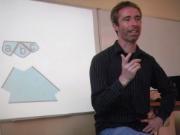
First Rand Foundation Mathematics Education Chair Researcher, Dr Duncan Samson received a prestigious emerging researcher award at the 22nd Annual Conference of the Southern African Association for Research in Mathematics, Science and Technology Education (SAARMSTE) held in Port Elizabeth recently.
He was honoured with the SAARMSTE Early Career Award for his significant, relevant and original contribution to the field of Mathematics Education.
“It’s a great honour to receive this award. The Emerging Researcher Award is a new award that SAARMSTE recently initiated, and it’s a particular privilege to be the first recipient of the award,” says Dr Samson.
“It is both satisfying and encouraging to receive the acknowledgement of one’s peers in the broader mathematics, science and technology education research community. For any researcher, but especially for one in the emerging stages of his career, it’s hugely motivating to receive recognition that one’s research is not only of a high quality, but that it’s being noticed by the broader community,” he added.
His paper titled “The allure of the constant difference in linear generalisation tasks” highlights the allure of the common difference within the context of figural pattern generalisation. It drew the attention of the SAARMSTE Awards Committee and was the basis for the award.
The study centres on an analysis of pupils’ lived experience while engaged in the generalisation of linear sequences presented in a pictorial context. The study is anchored within the interpretive paradigm of qualitative research and makes use of the complementary theoretical perspectives of enactivism, knowledge objectification and figural concepts.
“Very often we try to infer from learners’ written work what their reasoning process might have been. There are obvious problems associated with this, so for me the challenge was to try to gain access to the process of reasoning as opposed to the product of reasoning.
“What I wanted to engage with was the reasoning process in real time – i.e. learners’ lived experience. By broadening one’s notion of cognition to a more whole-bodied interpretation of the idea, one has the potential to access even unconscious levels of activity en route to a stable form of mathematical awareness.”
He said one particularly pleasing outcome is that he has gained insight into how learners approach different linear generalisation tasks. It has allowed him to develop a variety of pedagogical strategies and techniques that teachers can use in the classroom to support and challenge learners to be creative in their reasoning processes.
Dr Samson was previously Head of Mathematics at St Andrew's College in Grahamstown for a number of years prior to embarking on his PhD studies in Maths Education at Rhodes University in 2009. He is currently a full-time researcher for the First Rand Foundation Mathematics Education Chair at Rhodes University.
